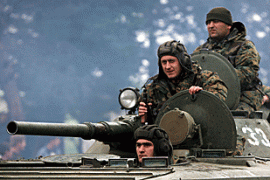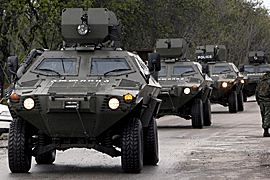Russia rejects Georgia mutiny claim
Moscow describes as “insane” claims by Tbilisi that it was behind military rebellion.

‘Coup plot’
Mikheil Saakashvili, Georgia’s president, had suggested Russia was behind the mutiny, saying those involved had “connections with special forces in a specific country known to us”.
| In depth |
|
|
“I am asking and demanding from our northern neighbour to refrain from provocations,” he said.
Georgia’s interior ministry earlier said it had uncovered a plot, ordered and financed by Russia, to overthrow the government.
But Grigory Karasin, Russia’s deputy foreign ministry, said Saakashvili’s government was “trying to shift their domestic problems onto Russia”.
“Instead of dialogue inside the country, the Georgian leadership is trying to accuse Russia of totally insane things,” he said.
Relations ‘undermined’
Neave Barker, Al Jazeera’s correspondent in Moscow, said the allegations had angered Russia.
| IN VIDEO | ||
|
| ||
More Videos… |
He quoted Dmitry Rogozin, Moscow’s envoy to Nato, as saying “this will undermine any chance to improve relations between Russia and Georgia and will also undermine relations between Russia and Nato”.
Rogozin said Nato would be better off holding its exercises “in a madhouse” since “Georgia’s military cannot properly receive their colleagues because they are rioting against their own president”.
The military exercises, due to be held from May 6 to June 3, will involve 1,000 soldiers from more than a dozen Nato member states and partner countries practising a “crisis response” at an army base east of Tbilisi.
The exercises are being seen as an act of solidarity with Georgia, which hopes to join the military alliance.
David Sikharulidze, Georgia’s defence minister, said Tuesday’s rebellion was aimed at disrupting the exercises.
Capital paralysed
But military experts in Tbilisi suggested the mutiny could be linked with plans to use troops to end opposition road blocks that have paralysed the capital for weeks, and that some officers had refused to participate.
 |
| Armoured vehicles were sent to surround the base, which lies outside Tbilisi [EPA] |
Matthew Collin, Al Jazeera’s correspondent in Tbilisi, said the growing instability in the region would not help Georgia’s attempts to join Nato.
He said it was not clear whether the rebellion would affect the upcoming Nato exercises, which will be taking place at a “very different military base”.
But the events appeared to have led Armenia, a Russian ally, to pull out of the exercises.
In a statement on Tuesday its defence ministry cited the “current situation” in Georgia as its reason for not participating in the games.
Russia has opposed Georgia’s entry into Nato, fearing the bloc is encroaching on its sphere of influence.
Sergei Lavrov, Russia’s foreign minister, on Tuesday dropped out of plans to attend a Nato-Russia council meeting later this month in protest against the bloc’s expulsion of two Russian diplomats.
Nato said it regretted Russia’s decision and hoped a new date would soon be agreed for the talks.

